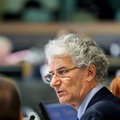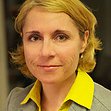Plenaries
The plenary sessions will take place in the main hall of the conference venue. There will be one plenary session for each of the 4 key challenges, with additional sessions for the latest results in climate-impacts research. The last session of the second conference day will be a special session dedicated to reviewing the achivements of the last 25 years in climate-impacts research, on the occasion of the 25th anniversary of the founding of the Potsdam Institute for Climate Impacts Research.
- I: Opening plenary
- II: The state of the art in climate-impacts research
- III: Counting the economic costs of climate change
- IV: Climate change and human health
- V: Climate change and human migration
- VI: Why climate-impacts research?
- VII: Climate change and Sustainable Development Goals
- VIII: Meeting the challenges: reflections & panel discussion

Prof. Dr. Dr. Hans Joachim Schellnhuber
Potsdam Institute for Climate Impact Research (PIK), Germany
Avoiding the Unmanageable, Managing the Unavoidable: A Slogan Revisited
Hans Joachim Schellnhuber has been Director of the Potsdam Institute for Climate Impact Research (PIK) since he founded the institute in 1992. He is Professor for Theoretical Physics at the University of Potsdam, Senior Research Fellow at the Stockholm Resilience Centre, and Member of the German Advisory Council on Global Change (WBGU).

Prof. Dr. Antje Boetius
Alfred Wegener Institute Helmholtz Center for Polar and Marine Research, Germany
Human impacts on polar and deep seas: Knowing the unknown
Together, the cryosphere and deep-sea cover the majority of the Earth’s surface, and provide important functions for this planet’s habitability, including a buffer against warming and excess CO2. They comprise a vast, yet uncharted diversity of habitats and life, by far exceeding continental biodiversity and genetic resources. However, polar and deep-sea ecosystems are remote and hardly accessible due to their physical conditions we call “extreme”. Temperatures below the freezing point, wind and waves, darkness and hydrostatic pressure amongst other factors challenge the presence of humans and even of robots and other observation platforms. In the absence of adequate observational capacities, our scientific knowledge on the evolution, distribution, dynamics and functioning of polar and deep-sea ecosystems is still meager. We lack ecological baselines and have not yet defined essential variables nor ecological indicators to observe and assess polar and ocean health. Nevertheless, there is substantial evidence of human footprints including climate change impacts, pollution and destructive use of resources in the most remote areas of Earth. Considering the observed and predicted speed of environmental changes, clear targets are needed for international policies and commitments to prevent irreversible shifts and losses. This presentation summarizes recent observations of change and impacts on polar and deep-sea ecosystems, and discusses conceptual strategies and rationales for including the unknown realms of Earth in sustainable development goals.

Prof. Dr. Rainer Sauerborn
Heidelberg University, Institute of Public Health and Harvard Chan School of Public Health, Germany
Why care about health impacts, apart from humanitarian reasons?
Climate change impacts population health in potentially serious ways. Childhood malnutrition, infectious diseases, diarrhea, but also chronic diseases are key impacts. The latter group includes heart diseases and stroke, allergies and asthma as well as mental disorders. Most of the impacts are potentially huge, but cannot exactly be quantified at our current state of science. One reason for this is the unavoidable uncertainty of projections- the bulk of impacts will occur only in the second half of this century; the other reason lies in the fact, that the field of researchers and institutions attaching priority to climate impact research is thin compared other sectors. This is worrying, as the world's ability to adapt to health impacts is particularly low in the global south. But even globally, adaptation through health interventions has absolute limits beyond a 1,5° world.
The positive side of the nexus of health and climate change lies in the notion that "health is the human face of climate change". It is a driving factor for engaging policy-makers. Moreover, it motivates individuals to engage in climate friendly behaviors. This has been shown in a recent comparative study in four European countries: households are more willing to engage in lower emission lifestyles, when and if they are given information on the health co-benefits that come with them. As about half of emissions in high income countries are controlled by household consumption patterns, this is a promising avenue to lower emissions. For low and middle income countries bearing the bulk of health impacts, we trust that better evidence on the health impacts will energize policy makers to increase their mitigation efforts, the costs of which, in turn, are considerably reduced when factoring in the saved costs of death and disease including saved health care costs.
Rainer Sauerborn is a physician by training. He currently leads a group of 12 young scientists and doctoral students at Heidelberg University carrying out research on climate impact/adaptation in the fields of childhood malnutrition and malaria, the health and emission implication of using traditional stoves in Africa and Asia.
Prof. Dr. Jacqueline McGlade
United Nations Office at Nairobi, Kenya
Impacts of Childhood Undernutrition in the face of Climate Change
One
third of children under 5 are born or develop in an undernourished state; half
of all child deaths are associated with undernutrition; twenty million children
suffer annually from severe acute malnutrition; and 160 million from stunting.
The annual costs worldwide of severe acute malnutrition alone are estimated to
be 3.5 trillion USD. Evidence from a wide range of studies and experiments
shows that this type of adversity in early life, especially in girls and during
the first 1000 days of life, is having far-reaching impacts not only on
individual survival but also on long-term health and social stability due to
cardiovascular disease, cognitive impairment, behavioural disorders, loss of
executive function and dementia. Left unchecked, undernutrition can potentially
create an intergenerational, self-reinforcing pathogenic cycle of violence and
behavioural disruption, which can spread through human displacement and
migration, and exacerbated by climate change.
Eradicating childhood
undernutrition, especially in low and medium income countries, is therefore
fundamental to achieving the sustainable development goals of ending poverty
and hunger, achieving food security and improved nutrition, ensuring healthy
lives, and inclusive, equitable societies.
Today,
millions of people living in marginal communities are at high risk of
undernutrition. Pastoralists, such as the Maasai, Pokot, Turkana, and Karimoja
in east Africa and the Pacific islanders of Samoa, Tonga and Tuvalu
and other small island communities are especially at risk. Pastoralists live in
some of the harshest environments, providing food and important environmental
benefits from rangelands covering one third of the Earth’s surface. However,
climate change, conflicts and changes in land tenure are placing them at
increasing risk of loss of livestock, malnutrition and starvation. Small island
communities face similar problems. Both suffer from a lack of recognition of
the gravity of their food security situation.
Tackling
the occurrence and long-term effects of childhood undernutrition requires policies
and actions that touch on public and maternal health, feeding practices, childhood
infections, long-term treatment of mental health and behaviroural disorders,
cardiovascular disease and cognitive impairment, restoration of degraded landscapes,
creation of livelihoods, land access, climate change and sustainable nutritious
food production.
Beyond this, is the deeper question of
whether is it possible to restore the cognitive loss that follows on from exposure
to undernutrition. Can we develop new artificial intelligence and cognitive
models based on social and epigenetic mechanisms to ameliorate the
intergenerational impacts of undernutrition on human lives?

Dr. Stephane Hallegatte
Global Facility for Disaster Reduction and Recovery (GFDRR) at the World Bank, United States
The “true cost” of climate change?
To assess how climate change impacts affect our ability to achieve international objectives, such as those described in the Sustainable Development Goals of the United Nations, we need a better understanding of people’s vulnerability, and a better consideration of the vulnerability of the poorest people. While there is a consensus on the fact that poor people are more vulnerable to climate change than the rest of the population, few quantified estimates had been proposed. Investigating the impacts of climate change at the household level, and focusing on households’ income and consumption, provides an important perspective on climate change impacts that complements top-down studies based on global or even national models. The results are consistent with previous research, with higher aggregate impacts in poorer countries, but they also suggest that poor people will be more affected than the rest of the population within countries. It means that poor people may be heavily affected by climate change even if aggregated impacts on GDP (and the other aggregated metrics that are usually used to measure impacts) remain limited. This presentation will summarize these results and their policy implications for mitigation and adaptation. It will discuss in particular the implications for the prioritization of adaptation actions and policies, the consequences on development planning and financing, and role of climate finance. It will conclude with some priorities for future research to better understand the interplay between climate change and poverty, and better support decision-makers in the development of pro-poor climate policies.
II: The state of the art in climate-impacts research
Wednesday 11 October, 11:00am, Kongress-Saal
Chair: Katja Frieler

Prof. Dr. Rupert Seidl
University of Natural Resources and Life Sciences (BOKU) Vienna, Austria
Climate impacts on forests: The good, the bad and the ugly
Forests ecosystems cover 31% of the global land area and play a pivotal role in the achievement of many Sustainable Development Goals. However, due to their longevity forests are also inherently susceptible to changes in the climate system. Increased levels of atmospheric CO2 and moderate warming have facilitated tree growth in many parts of the globe in recent decades. This greening trend is currently mitigating anthropogenic climate change, with forest carbon (C) uptake estimated to offset 60% of the cumulative fossil emissions since 1990. The future development of the forest C sink remains uncertain, however, as it will strongly depend on changes in water availability and the persistence of a CO2 fertilization effect. A further crucial element in the future of our forests is a potential climate-induced change in tree mortality. In general, climate warming could increase mortality related to high temperatures, offset by simultaneously reduced tree deaths in response to low temperatures. However, pulses of tree mortality from disturbances such as drought, wildfire, and insect outbreaks are likely to increase in forests around the globe. The high climate sensitivity of forest disturbances is furthermore amplified by positive (facilitating) interactions between individual disturbance agents. In addition to disturbances occurring naturally in forest ecosystems climate change also facilitates the spread of novel agents of tree mortality. Invasive alien pest species can cause particularly severe damage, because they often lack natural enemies in their new range, and meet naïve hosts that have not adapted to these pests through coevolution. Both natural and alien disturbances are expected to substantially decrease the future capacity of forests to take up and store C. Overall, climate impacts will drastically alter forest ecosystem dynamics, resulting in opportunities but also substantial challenges for the sustainable provisioning of ecosystem services to society.
Rupert Seidl is professor of forest ecosystem management at the University of Natural Resources and Life Sciences (BOKU) Vienna, Austria. His research focuses on forest ecosystem dynamics in general and the role of climate and disturbances in forest ecosystems in particular.

Dr. William Cheung
Nippon Foundation Nereus Program, The University of British Columbia, Canada
Future sustainability of seafood production under climate change
Global seafood production from fisheries and mariculture contributes substantially to food security, health, economic benefits and livelihood opportunities of our society. Climate change is challenging the sustainability of seafood production through changes in the coupled human and natural marine systems such as ocean primary productivity, trophic dynamics, the economics of fishing, market access and dynamics, as well as local and global ocean governance. Moreover, non-climatic human drivers such as over-exploitation, climate change, pollution and habitat destruction are affecting the sensitivity of seafood production systems to climate change. There is a need to develop approaches that integrate these factors and drivers to project future seafood production under climate change. Here, I will explore approaches that integrate human and natural dimensions of marine systems to understand climate change impacts on future seafood production and their implications for sustainable development. These approaches range from expert-based assessment to quantitative models that integrate across biophysical and social-economic components. Furthermore, I will discuss the utilities of these approaches in examining the effectiveness of ocean-based solution options in mitigating and adapting climate change impacts on marine biodiversity and ecosystem services.
William Cheung is an Associate Professor and the Director of Science of the Nippon Foundation-UBC Nereus Program at the Institute for the Oceans and Fisheries, UBC. His research addresses the key challenges in understanding and predicting the responses of marine ecosystems and fisheries to global changes, as well as identifying and evaluating solution options to ensure the sustainability of marine and coastal ecosystems and communities.

Prof. Dr. Reimund P. Rötter
University of Göttingen, Department of Crop Sciences, Tropical Plant Production and Agricultural Systems Modelling (TROPAGS), Germany
State of the art in crop modelling for climate-impact research
Crop production and associated ecosystem services such as food security and carbon sequestration are sensitive to climate variability and change. While global food security is primarily threatened by an increasing world population, income growth and dietary changes, climate change (CC) amplifies the threats. Agricultural systems are challenged to adapt to climate change and concurrently intensify mitigation efforts, while fulfilling the increasing global demand for food, feed and fibre in a world with increased competition for natural resources. This requires designing resilient and productive cropping systems. Process-based crop models have played a key role – since the 1st IPCC Assessment Report (1990) - in assessing climate change impacts on plant growth, crop yield and water use. Their capability to quantify genotype x environment x management interactions makes them in principle, the best possible tools for this as well as for ex ante evaluation of CC adaptation and mitigation options. This paper aims to present progress in crop modelling for climate impact research, especially during last decade, and address a number of unresolved research issues. Through concerted efforts, especially since 2010/11, methods and tools for crop-climate modelling have been improved considerably. Improvements range from better capturing effects of extreme heat to how uncertainties of in crop impact projections are quantified. Yet, there are still a couple of short-comings to be urgently addressed. This applies especially- but not exclusively - to crops and cropping systems in the (sub-)tropics. Challenges for improvement range from the need to better quantify crop impacts of flooding, intensive rain, pests and diseases, to the joint use of ecophysiological models with genomics to support breeding. Further progress in crop modelling will eventually enhance the quality of integrated assessment and modelling of CC impacts on agriculture.
Dr. Reimund P. Rötter is Professor of Tropical Plant Production and Agricultural Systems Modelling at Georg-August-University of Göttingen, Germany. He is an agronomist, agro-ecologist and agrosystems modeller with >25 years research experience in Africa, Asia and Europe.

Dr. Carl-Friedrich Schleussner
Climate Analytics, Germany
Half a degree matters - climate impacts at 1.5°C and 2°C
Robust appraisals of climate impacts at different levels of global-mean temperature increase are vital to guide assessments of dangerous anthropogenic interference with the climate system. After the establishment of 1.5°C as the long term limit for global average temperature increase in the Paris Agreement, discriminating climate impacts between warming levels of 0.5°C difference is high on the post-Paris science agenda.
I will present multiple lines of evidence regarding differences in climate impacts between 0.5°C warming increments including from the observational record as well as targeted modelling studies. Differences between 1.5°C and 2°C are region and indicator specific. Hot-spots of change emerge with tropical regions bearing the brunt of the impacts of an additional 0.5°C warming. These findings highlight the importance of regional differentiation to assess both future climate risks and different vulnerabilities to incremental increases in global-mean temperature.
Carl is Head of Climate Science and Impacts and a Scientific Advisor to Climate Analytics. He has longstanding expertise in climate modelling and climate impact science, and multi-year experience in providing scientific advice at the climate-policy interface including targeted scientific support to SIDS and LDCs in the UNFCCC process.

Prof. Dr. David Bresch
ETH Zürich, Switzerland
Open-source economics of climate adaptation - learnings and challenges from case studies worldwide
Improving the resilience of our societies in the face of volatile weather and climate change is an urgent priority today and will increase in importance in the decades to come. The climate of the past is by no means a sufficient basis for decisions going forward. Never in history has society known so much about the processes that shape weather impacts today and been able obtain a wealth from forward-looking weather and climate information – yet pre-emptive (and precautionary) action to manage weather and climate-related impacts is not always taken. While measures exist to adapt to an ever-changing environment, decision makers need the facts to identify the most cost-effective instruments, they need to know the potential weather and climate-related damages over the coming decades, to identify measures to mitigate these risks – and to decide whether the benefits will outweigh the costs. The open-source Economics of Climate Adaptation (ECA/climada) methodology provides decision makers with a fact base to answer these questions in a systematic way. Using state-of-the-art probabilistic modelling, we estimate the expected economic damage as a measure of risk today, the incremental increase from economic growth and the further incremental increase due to climate change. We then build a portfolio of adaptation measures, assessing the damage aversion potential and cost-benefit ratio for each measure. The application of a such worldwide consistent, yet locally specific methodology to strengthen climate resilience therefore allows integrating adaptation with economic development and sustainable growth. A synthesis of more than twenty case studies worldwide provides insights both into model-facilitated stakeholder engagement and remaining challenges - from capacity building to overcoming implementation hurdles.
Prof.
Dr.
David N. Bresch, Professor for Weather and Climate Risks
at ETH Zürich/MeteoSwiss since
2016. 2000-2016, roles at
Swiss Re included Head Business Development, Global Head
Sustainability, Head
Atmospheric Perils Group and Chief modeler for natural
catastrophe risk
assessment.
 III: Counting the economic costs of climate change
III: Counting the economic costs of climate change
Wednesday 11 October, 2:00pm, Kongress-Saal
Chair: Anselm Schultes
Co-chairs: Tobias Geiger and Sven Willner

Prof. Dr. Ilan Noy
Victoria University of Wellington, New Zealand
Impacts of Disasters
Climate change will change the probability distribution of extreme weather events (cyclones, droughts, and floods). The economic consequences of these events are therefore part of the impact of climate change. What do we know about the easily observable costs of these events, and what are some of their unobserved economic consequences?

Dr. Shardul Agrawala
OECD Environment Directorate, France
Quantifying the economic consequences of climate change
Literature on the economic costs of climate change is not new. However, recent advances in economic modelling and empirical analysis have deepened our knowledge on at least two questions. First, computable general equilibrium modelling approaches are increasingly applied to examine how climate change might impact specific aspects of the economic production function, through supply of factors such as capital, impacts on labour productivity, and changes in the structure of demand. Second, a new field of empirical analyses has emerged that seeks to better harvest knowledge on how climate variations and change have impacted economic activity that is buried in the historical record to better inform projections of the anticipated consequences of climate change. This presentation will assess these developments, with an attempt to reconcile the varying impacts projected by the two bodies of literature. Concluding remarks will identify priorities for further research.
Shardul Agrawala is Head of the Environment and Economy Integration Division at the OECD Environment Directorate. In this capacity, Dr. Agrawala leads the Directorate’s work on economic-environmental modelling, empirical analysis of environmental policies, trade and environment, and on resource productivity and waste.
Dr. David Anthoff
University of California, Berkeley, United States
The next generation of Social Cost of Carbon estimates
Estimates of the Social Cost of Carbon have played an important role in US federal climate policy design over the last decade. I will review what we have learned from this interesting interplay of academic research and real world policy making, discuss some major critical issues that have emerged in this science-policy interface and sketch a research agenda for the next generation of Social Cost of Carbon estimates.
David Anthoff is Assistant Professor in the Energy and Resources Group at University of California at Berkeley, USA.

Dr. Greg Holland
University Corporation for Atmospheric Research (UCAR), United States
Tools in support of reducing the impacts of weather and climate extremes
Our research and development also acknowledges that all systems will fail at some level and thus we implicitly incorporate ‘graceful failure’ as a key feature. An explanation of the benefits of this approach also will be provided.
Greg Holland is Willis Senior Scientist in the Mesoscale and Microscale Meteorology Laboratory of NCAR, and Director of the Capacity Center for Weather and Climate Extremes (C3WE).
 IV: Climate change and human health
IV: Climate change and human health
Thursday 12 October, 9:00am, Kongress-Saal
Chair: Veronika Huber
Co-chair: Linda Krummenauer

Prof. Dr. Andy Haines
London School of Hygiene and Tropical Medicine, United Kingdom
Reducing risks to health from climate change in the Anthropocene epoch
Climate change poses risks to health through multiple pathways. Improving understanding of the most important risks and developing effective strategies to address them through adaptation and mitigation are key priorities. One example is exposure to increasing heat stress which reduces labour productivity and increases the risk of heat related mortality. A key question is how different GHG emission pathways affect population exposure to levels of heat stress which, in some locations, might threaten social cohesion and therefore perhaps habitability. The presentation will outline recent work reviewing the evidence of the effects of extreme heat stress and modelling population exposure under different emission pathways.
For some health outcomes, such as those related to delivering healthy and sustainable diets to a growing world population, the effects of multiple environmental stressors e.g. climate change, freshwater declines, soil degradation and/or pollinator loss should be taken into account. The potential implications of doing so will be illustrated by the results of recent systematic reviews of the effects of environmental changes on yield and nutritional quality of fruit and vegetables which are important for the prevention of common non-communicable diseases ( e.g. cardiovascular disease and some cancers).
Monitoring progress in climate change adaptation and mitigation for health will be increasingly important for holding governments and other decision makers to account. The presentation will conclude with a brief overview of progress and challenges in monitoring and attribution.

Prof. Dr. med. Christian Witt
Charité – Medical University Berlin, Germany
Clinical Climate Impact Research – The Lungs as Portal Organ of Climate Change
The global climate changes lead to an increase in frequency and intensity of periods with extreme temperatures. The occurring heat waves negatively affect the health status of vulnerable groups, including newborns, elderly people, and patients with chronic diseases. We chose to focus our research on patients with chronic obstructive respiratory diseases (COPD) and the impact of climate changes on their disease status (Research Unit 1736 “Urban Climate and Heat Stress in Mid-latitude Cities in View of Climate Change” funded by the Deutsche Forschungsgemeinschaft).
To investigate the relationship between disease progression and ambient temperature, we analyzed patient admission rates to hospitals in Berlin from four summer periods. On the other hand, to counter the heat-stress related effects on disease progression, we set up patient rooms with an air-convection free radiant cooling system. In a prospective randomized clinical trial, patients with acute exacerbation of COPD were randomly assigned to either a conventional patient room, or a patient room with a controlled ambient temperature of 23°C (Registry DRKS Nr. 00004931; http://apps.who.int/trialsearch).
The analysis of hospital admission data revealed an increase in chronic obstructive pulmonary disease exacerbations on days with a maximum temperature of 29°C and above. Patients hospitalized in climatized patient rooms showed a higher degree of mobilization and were discharged earlier than patients treated in conventional patient rooms. Our results indicate that the identification of vulnerable patient groups combined with climate control in urban hospitals could become a potential adaption strategy to global climate changes.
Professor Dr. med. Christian Witt is Professor of Internal Medicine/ Pneumology and Deputy Director of the Department Infectiology and Pneumology at Charité - Universitätsmedizin Berlin, Germany. He is an agent of the President of the European Parliament as International Medical Consultant and author of different National Guidelines and policy documents. His research activities focus i.a. on Urban Climate Change and Heat stress.
Dr. Antonio Gasparrini
London School of Hygiene and Tropical Medicine, United Kingdom
Temperature, climate and health: results from the MCC Project
Epidemiological associations between non-optimal temperature and human health are markedly heterogeneous across populations living in different regions of the world, and so are the future health impact projected in a changing climate. I present here the findings from a comprehensive assessment performed by the Multi-City Multi-Country (MCC) network, an international collaboration of research teams working on a program aiming to produce evidence on associations between weather, climate and health.
The MCC Project has gathered daily time series data on temperature and mortality counts for several outcomes from 455 locations in 24 countries between 1972 and 2012. These data were analysed using state-of-the-art analytical methods based on two-stage designs using distributed lag non-linear models and multivariate meta-analysis, to obtain location-specific estimates of temperature-mortality associations and to pool them across countries, regions, and globally.
Separate analyses have investigated different aspects of the association, such as the relative and attributable risk for heat and cold compared across locations, the factors responsible for these heterogeneous relationships, the temporal variation in risk and related adaptation patterns, the effects associated to extreme weather events and to day-to-day and within-day temperature changes, the variation in minimum mortality (optimal) temperature, and the projected impact under climate change scenarios, among others.
The MCC Study represents by far the largest epidemiological investigation on temperature, climate, and human health. Results from this international project provides important information for planning local and global public health and climate policies and adaptation strategies to attenuate current and future health burden associated to non-optimal temperature.
Dr Antonio Gasparrini is Associate Professor of Biostatistics and Epidemiology at the London School of Hygiene & Tropical Medicine.

Prof. Dr. Matthew Huber
Purdue University, United States
The dynamics of moist heat stress and their implications for future predictions
The heat stress of interest in this talk is derived from consideration of covariances of temperature and humidity. As such, moist heat stress may be thought of as being directly related to typical meteorological variables such as sub cloud equivalent potential temperature or convective available potential energy. Implications of this syllogism are substantial insofar as they directly tie moist heat stress to very predictable large scale dynamical constraints. We sketch these implications using output from CMIP5 simulations as well as higher resolution regional climate model simulations.
Matthew and his research group (the Climate Dynamics Prediction Lab) work on developing a better understanding of and ability to predict the dynamics of the climate system with an emphasis on investigating past warm climates as a window into future behavior. Much of this work focuses on atmosphere-ocean dynamics with an emphasis on hot conditions, e.g. the tropics.
Prof. Dr. Andy Morse
University of Liverpool, United Kingdom
Climate Models and the Prediction of Vector Borne Diseases
Climate and weather model data with different lead times from days to multi-decades are routinely produced by major forecasting and climate research centres across the world. Rarely are these forecasts and projections used to improve health especially for vector borne diseases. This contrasts with the take up of similar information by agriculture and water resource sectors. The reasons for the differential uptake between user communities is not clear, it is partly because climate and weather does not normally appear within health training, and in additional information sharing between government ministries in many developing countries, especially in Africa, is often poor. This paper will show how temperature and rainfall data, from both seasonal lead time predictions and climate change projections, can be used in conjunction with the Liverpool Malaria Model. Examples will be shown of skillful seasonal forecasts of forthcoming malaria risk for parts of Africa, and for future climates the emergence and possible de-emergence of malaria in Africa. If time allows then recent work on Zika virus emergence and other vector borne diseases may be included. Finally, the paper will consider the challenges of communicating forecast information to various levels of society.
 V: Climate change and human migration
V: Climate change and human migration
Thursday 12 October, 11:00am, Kongress-Saal
Chair: Kira Vinke
Co-chairs: Sophie Rottmann, Jacob Schewe and Jonathan Donges

Dr. Andrea Tilche
European Commission: DG Research and Innovation (DG RTD), Belgium
Science-policy considerations on climate change impacts research on health and migration
Andrea Tilche is head of the unit Climate Action and Earth Observation within the European Commission’s DG Research and Innovation (DG RTD). Prior to this post he was acting director of the directorate Climate Action and Resource Efficiency. His extensive experience in science management in Brussels also includes leading the Environmental Technologies Unit of the 7th Framework Programme (FP7), the Unit on Water and Soil Research of FP6 and the Water Key Action of FP5.

Prof. Dr. Ulrike Grote
Institute for Environmental Economics and World Trade, Leibniz University Hannover, Germany
Rural-urban migration and climate change: evidence from Southeast Asia
Hundreds of millions of people in Asia are expected to increasingly face flooding and rising sea levels in the future. To what extent are these environmental factors likely to trigger rural-urban migration? This presentation investigates the interactions between shocks, human rural-urban migration and welfare from two comprehensive case studies conducted in six provinces in Thailand and Vietnam. Panel data of around 4,400 rural households covering the period 2007 and 2010 and tracking surveys of close to 1,000 migrants from the greater areas of Bangkok and Ho Chi Minh City in 2010 are used. The empirical evidence suggests that migration for employment is a livelihood support strategy for households exposed to climate-related agricultural and economic shocks. Given the scarcity of employment opportunities in the rural areas, migrants see themselves forced to look for jobs in the cities. Interestingly, most migrants perceive themselves to be better off in the cities. The rural households left behind benefit from migration as the remittances tend to have positive income growth effects. These effects which are more pronounced in provinces with fewer job opportunities, help not only migrant households moving out of poverty, but they also improve the poverty situation in rural areas. The research confirms the calls for improved social protection for migrants in urban areas and for quality schooling and employment creation in the rural areas.
Prof. Dr. Ulrike Grote heads the Institute for Environmental Economics and World Trade, School of Economics and Management, of the Leibniz University Hannover since 2006. Her research focuses on international trade, environmental and development economics, especially in Southeast Asia and Africa.

Susanne Melde
Global Migration Data Analysis Centre (GMDAC), International Organization for Migration (IOM), Germany
Adaptation to environmental and climate change: The role of human mobility
Mobility is one option among the responses to adapt to environmental and climate change. This presentation focuses on findings from an innovative global study on mobility as adaptation in the Dominican Republic, Haiti, Kenya, the Republic of Mauritius, Papua New Guinea and Viet Nam. Policy implications include the need to foster policy coherence through data collection, research and capacity-building, and prioritizing vulnerable groups, including by developing early warning systems.
Susanne Melde is a Senior Analyst at the Global Migration Data Analysis Centre (GMDAC) at the International Organization for Migration (IOM) in Berlin, Germany.
Dr. Koko Warner
United Nations Framework Convention on Climate Change (UNFCCC), Germany
How human mobility fits into climate policy
Issues of human mobility have entered into and influenced discussions in the UNFCCC, against the background of emerging understanding of climate impacts, vulnerabilities and risks and what society can do to manage them. The empirical and other research work of the climate impacts community has helped in the early framing of climate change and human mobility. How and why has the topic of human mobility developed as a risk management theme in contrast with the established lines of the Global Compacts on Migration and Refugees? To investigate this question, the talk will examine international decision texts and documents under the UN Framework Climate Change Convention (UNFCCC), particularly work under adaptation and loss and damage agenda items. These texts illustrate how the topic has progressed in the international climate policy arena between approximately 2010 when the Cancun Adaptation Framework introduced it in paragraph 14(f), and the present work of the Task Force on Displacement created in the Paris Agreement. Climate policy work has emphasized building the resilience of vulnerable countries and empowering them to make risk-informed decisions about preemptive and planning activities, and contingency arrangements that affect where and how people live. The Paris Agreement set the parameters for a climate neutral world by mid-century, which provide the international community the scope of climate impacts that regions and countries need to prepare for. At the time of the IMPACTs Conference 2017, the Task Force on Displacement was developing recommendations. The next steps include the global community devising ways to take up the recommendations in ways that avert, minimize, plan for, and put contingency arrangements into place for human mobility in a climate-resilient, sustainable future.
Dr. Koko Warner (United Nations Climate Secretariat, UNFCCC) helps countries find ways to address impacts, vulnerabilities, and risks from climate change in communities across the world. She has a science background researching the impacts of climate change in communities across the world, with an international profile on climate risk management and insurance, and human mobility (migration, displacement, planned relocation).VI: Why climate-impacts research?
Thursday 12 October, 4:00pm, Kongress-Saal
Chair: Lila Warszawski
25 years of the Potsdam
Institute - that's 25 years of climate impact research. In this very special
session on the occasion of our anniversary we will reflect upon what has been
achieved in the past quarter of a century. Yet more importantly we will discuss
what sustainability science should do in the future. What are the challenges
ahead, what do decision-makers expect from the research community, and how can
science inform political processes such as the next UN climate summit in Bonn?
The session will be opened by the renowned Orchestra of Change with a
thought-provoking climate concert.
It will end with a short 5-min surprise film screening.

Dr. Martina Münch
Minister for Science, Research and Culture of the State of Brandenburg, Germany
Welcome note
The Minister for Science, Research and Culture of the State of Brandenburg will open this special plenary session.
Dr. Martina Münch is Minister for Science, Research and Culture of the State of Brandenburg since 2016. Dr. Münch studied medicine and worked in neurology at the Rudolf Virchow Clinic in Berlin after receiving her Ph.D.

Thomas Rachel
Federal Ministry of Education and Research (BMBF), Germany
Welcome note
Thomas Rachel will deliver a welcome note.
Thomas Rachel has been a Parliamentary State Secretary to the Federal Minister of Education and Research since November 2005. In this function, he supports the Minister in fulfilling her governmental duties, in particular in the parliamentary sphere. He is a member of the Senate of the Fraunhofer Society (FhG).

Prof. Dr. Dr. Hans Joachim Schellnhuber
Potsdam Institute for Climate Impact Research (PIK), Germany
Climate Impacts Research and the Potsdam Institute: A Quarter-Century Reflection
About a decade ago, I invented the slogan in the title, which played a certain role in the climate debate since then. The motto summarizes the dual challenge of confining global warming to sub-disastrous levels (mitigation), while properly dealing with the residual changes in the environmental conditions worldwide (adaptation). That take was consistently reflected by several major reports by the World Bank and other development institutions. Ten years after, how has our perspective on this twofold task evolved?
As for the mitigation part, everything needs to be revaluated in light of the Paris Agreement. In particular, has the right climate target been chosen there and how can we realize it? As for the adaptation part, the most relevant information has to be provided by impacts research that is slowly coming of age. Are we able to equip stakeholders and sectors with operational projections into a +1.5-2°C world?
My lecture will touch upon these questions and try to identify crucial knowledge gaps. The keynote will end with a view on the future of multilateralism.
Hans Joachim (John) Schellnhuber has been Director of the Potsdam Institute for Climate Impact Research (PIK) since he founded the institute in 1992. He is Professor for Theoretical Physics at the University of Potsdam, Senior Research Fellow at the Stockholm Resilience Centre, and Member of the German Advisory Council on Global Change (WBGU). As Chair of the High-Level Panel of the European Decarbonisation Pathways Initiative, he advises the EU-Commissioner for Research, Science and Innovation Carlos Moedas. John is appointed member of the Pontifical Academy of Sciences and elected member of the Leopoldina, the Academia Europaea, the US National Academy of Sciences (NAS), the Max Planck Society and several other academies.
Patricia Espinosa
Executive Secretary of the United Nations Framework Convention on Climate Change (UNFCCC), Germany
Adress from the Executive Secretary of the United Nations Framework Convention on Climate Change (UNFCCC)
Ms. Espinosa is the Executive Secretary of the United Nations Framework Convention on Climate Change. Ambassador of Mexico to Germany since 2012 and from 2001 to 2002, Ms. Espinosa was Minister of Foreign Affairs of Mexico from 2006 to 2012, bringing more than 30 years of experience at highest levels in international relations, specialized in climate change, global governance, sustainable development, gender equality and protection of human rights. Elected Chair of the Third Committee of the UN General Assembly (1996) she played a key role in the process leading to the adoption of the Beijing Platform for Action at the 4th World Conference on Women. Previous Ambassador of Mexico to Austria, Slovakia, Slovenia and UN Organisations in Vienna 2002‐2006), she was Chief of Staff to the Undersecretary of Foreign Affairs, Ministry of Foreign Affairs (1989‐1991) and responsible for economic issues at the Permanent Mission of Mexico to the UN in Geneva (1982‐1988).
She has postgraduate studies in International Law from the Institut Universitaire de Hautes Etudes Internationales in Geneva and is holder of a Degree in International Relations from El Colegio de Mexico.

Prof. Dr.-Ing. Matthias Kleiner
President of the Leibniz Association, Germany
Why the world would urge for a PIK if it didn't already exist? Congratulations to the 25th anniversary
Matthias Kleiner completed his habilitation in the field of forming technology in 1991. Professor Kleiner was awarded the most prestigious prize in German research, the DFG’s Gottfried Wilhelm Leibniz Prize in 1997. In 2011, he co-chaired the German “Ethics Commission for a Safe Energy Supply”. Matthias Kleiner was elected President of the German Research Foundation (DFG) in 2007. His six year-term of office as President of the DFG ended in December 2012. Matthias Kleiner assumed office as President of the Leibniz Association in July 2014.

Carlos Moedas
European Commission
A video message from the European Commissioner for Research, Science and Innovation

Prof. Dr. Klaus v. Klitzing
Nobel Laureate, Max Planck Institute for solid state research, Germany
Climate-impacts research and the importance of basic science
Climate change is real and the scientific research on the one hand enables us to understand more and more details about this most complex dynamic system and to predict consequences. On the other hand the research offers solutions about reducing some of the negative outcomes of human made distortions. However, many problems are waiting for an ideal answer and breakthroughs in science.
 VII: Climate change and Sustainable Development Goals
VII: Climate change and Sustainable Development Goals
Friday 13 October, 9:00am, Kongress-Saal
Chair: Alexander Popp
Co-chair: Prajal Pradhan

Prof. Dr. Johan Rockström
Stockholm Resilience Centre, Sweden
World Development within a Resilient and Stable Earth system - Only Path to the SDGs
The Sustainable Development Goals (SDGs) was a major breakthrough when adopted by the UN in 2015. For the first time the world committed to a roadmap aimed at attaining aspirational goals for equitable and good life for all co-citizens in the world within global targets for climate, biodiversity, oceans and freshwater, i.e., a clear recognition that success for the world depends on sustainable stewardship of Earth. Two years down the line, we are struggling to operationalise the SDGs into a new paradigm for world development. Science is clear that all SDGs must be kept together as one integrated agenda for global sustainable development. Succeeding moreover requires a global transformation, across all sectors of societies and economies, with urgent fast track pathways to (i) decarbonise the world energy system by 2050, (ii) transition to healthy diets from sustainable food systems within one generation, (iii) transition to sustainable cities in a rapidly urbanising world, and (iv) transform the world economy to a sustainable and circular logic. We need a deep mind-shift, reconnecting our world to the Earth system, and step-up business and policy action based on science based targets for climate and biosphere. Fundamentally, the path to the SDGs is a transition to world prosperity within planetary boundaries.
Johan Rockström is a professor in global sustainability at Stockholm University, and a leading scientist in resilience, global sustainability and sustainable development. He is the Director of the Stockholm Resilience Centre at Stockholm University, and the former Executive Director of the Stockholm Environment Institute.
Dr. Leena Srivastava
TERI University, India
Climate Change and SDGs: Policy Coherence?
Dr. Leena Srivastava is the Vice Chancellor of the TERI University, New Delhi – a uniquely inter-disciplinary higher education institution, focussed on sustainable development. Dr Srivastava has over thirty years of experience in the fields of energy and environment, including climate change, policy and economics.

Dr. Maja Göpel
German Advisory Council on Global Change (WBGU), Germany
The Great Mindshift: Soft Power in Sustainability Transformations
The cultural dimension of sustainable development, subjective ideas and intersubjective stories with which humans make sense of the world, is intricately linked with the ‘objective’ world composed of purposefully invented institutions, infrastructures and technologies. Reflexivity is the uniquely human capacity to assess the underlying ideas and stories upon which these institutions and artifacts have been built, justified, maintained and adapted. Unsurprisingly, the call for a mind- or paradigmshift has become ubiquitous in the sustainability transformation community. This talk highlights how a great mindshift can radically alter the purpose and benchmarks with which humans engage in innovation, collaboration and investment – and how the old economic growth mindset and story has become a source of mental barriers, strategic power or even forceful domination.
Maja Göpel is Secretary General of the German Advisory Council on Global Change. Her research, engagement and publications focus on system transformations for sustainable development, new prosperity models with an emphasis on the role of paradigm shifts as strategic leverage points.

Prof. Dr. Dirk Messner
German Development Institute (DIE), Germany
Development and justice through transformation: The Four Big 'I's
2015 saw a historic double success for sustainability and climate policy. The 2030 Agenda for Sustainable Development, with its Sustainable Development Goals (SDGs), and the Paris Agreement on climate protection establish a system of ambitious policy goals for the world.
Complete decarbonization of the world economy by 2070 at the latest can only be achieved by profoundly transforming energy systems and other high-emissions infrastructures. This transformation could inspire Innovation and channel Investment into sustainability and climate protection, e.g. into sustainable Inftrastructures that need to be established and expanded. At the same time, the transformation could combat inequality and promote Inclusion within societies and globally, thus becoming an equity project. Sustainable development, and in particular global climate protection, is currently the only ambitious undertaking that involves all the world's nations and resulted in a global consensus. Achievements in this enormous, complex policy field enable countries to establish mutual trust, making the 'Great Transformation' to sustainability also a peace project.
VIII: Meeting the challenges: reflections & panel discussion
Friday 13 October, 2:00pm, Kongress-Saal
Chair: Christopher Reyer

Prof. Dr. Martin Visbeck
GEOMAR, Helmholtz Centre for Ocean Research Kiel, Germany
Reflections & panel discussion
Prof. Visbeck’s research is concerned with ocean and climate variability and change and ocean sustainability. A recent regional focus is the circulation of the Atlantic. Where his group maintains the world’s longest direct current measurement series to document the variability of North Atlantic Deep Water transport in the Labrador Sea, a key component of the Atlantic Overturning Circulation. In the context of a Kiel based collaborative research centers on climate-biogeochemical interactions in the tropical ocean his work focuses on the supply of oxygen towards the extensive tropical oxygen minimum zones by diapycnal mixing and lateral eddy transfer. In his research he makes use of expeditions but also is increasingly using and advancing modern robotic platforms including profiling floats and gliders, and long-term observations in the water column. Furthermore he is advaning integrated marine research in the context of ocean sustainable development.

Guido Schmidt-Traub
Executive Director of the UN Sustainable Development Solutions Network, France
Reflections & panel discussion
Guido Schmidt-Traub is Executive Director of the UN Sustainable Development Solutions Network and a member of the Governing Council of Future Earth. He has served as climate change advisor to the Africa Progress Panel secretariat and was CEO of Paris-based CDC Climat Asset Management, an investment company regulated by the French financial markets regulator. From 2008-2010 Guido was Director and Partner at South Pole Carbon Asset Management in Zurich, a leading developer of greenhouse gas emission projects. Prior to managing the MDG Support Team at UNDP (2006-2008) he served as Policy Advisor and then as Associate Director of the UN Millennium Project in New York, which was tasked with developing a concrete action plan for the world to achieve the Millennium Development Goals. Earlier Guido was Partner at IndexIT Scandinavia, a private equity fund for early-stage technology companies, and consultant at McKinsey & Company in Germany.

Kaisa Kosonen
Greenpeace International, The Netherlands
Reflections & panel discussion
Kaisa Kosonen is a Senior Policy Advisor on global climate
politics and the IPCC Focal Point for Greenpeace. She has some 15 years
of experience in advocacy and campaign work related to climate change,
energy and sustainability on an international, European and national
level. Kaisa holds a B.Sc. in Administrative Sciences from the
University of Tampere, Finland.

Prof. Dr. Hans-Otto Pörtner
Alfred Wegener Institute, Germany & Co-chair of the IPCC WGII
Reflections & panel discussion
Hans-O. Pörtner studied at Münster and Düsseldorf Universities where he received his PhD and habilitated in Animal Physiology. As a Research and then Heisenberg Fellow of the German Research Council he worked at Dalhousie and Acadia Universities, Nova Scotia, Canada and at the Lovelace Medical Foundation, Albuquerque, NM. Currently he is Professor and Head of the Department of Integrative Ecophysiology at the Alfred Wegener Institute for Marine and Polar Research, Bremerhaven, Germany. Until the end of 2014 he served as a Coordinating Lead Author of IPCC WGII AR5, chapter 6, Ocean Systems and as a member of the author teams for the WGII Summary for Policymakers and Technical Summary, as well as a member of the Core Writing Team for the IPCC AR5 Synthesis Report. In October 2015 he was elected Co-Chair of Working Group II of the IPCC.